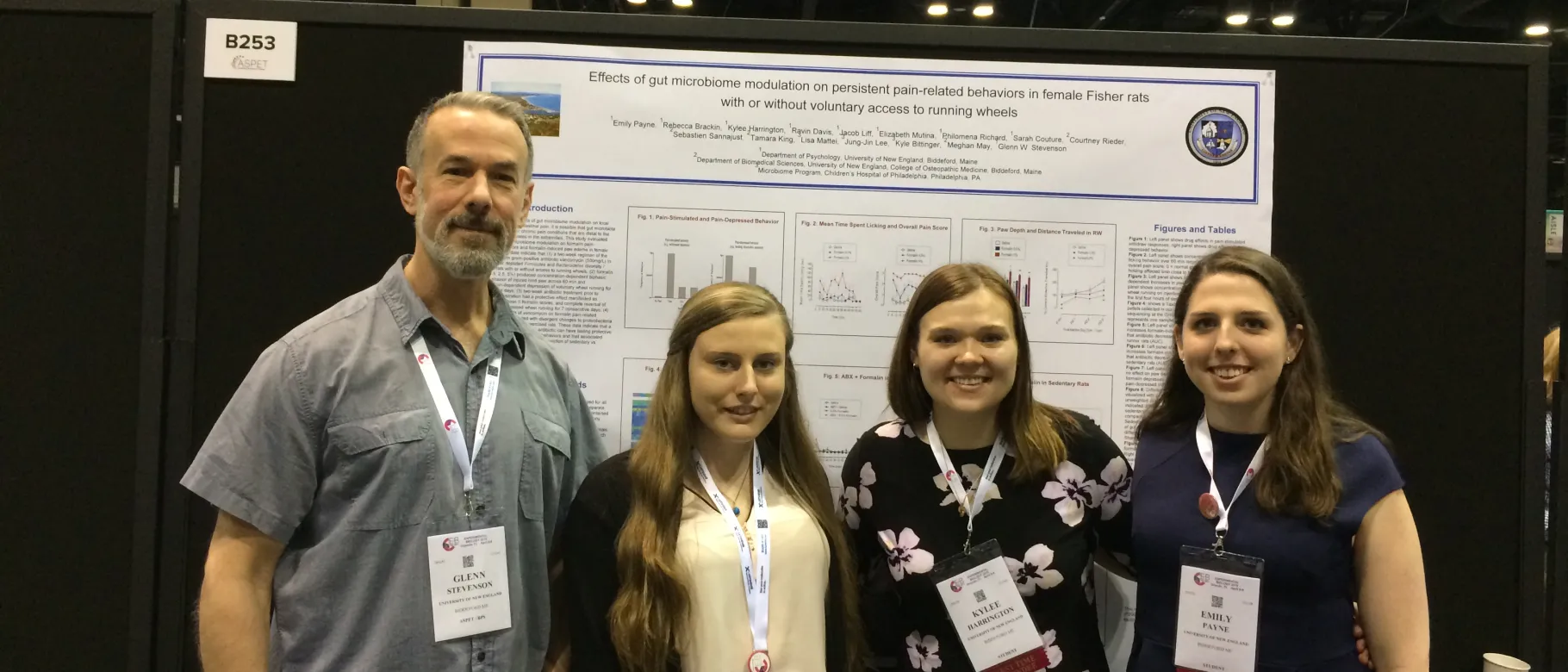Novel opioid research by UNE’s Glenn Stevenson and former undergraduate students published in prestigious journal

Glenn Stevenson, Ph.D., professor of psychology and coordinator of the Neuroscience program, recently published a paper on the pharmacology of a novel opioid painkiller co-authored by seven former University of New England undergraduate students.
The paper, “Behavioral Pharmacology of the Mixed-Action Delta-Selective Opioid Receptor Agonist BBI-11008: Studies on Acute, Inflammatory and Neuropathic Pain, Respiration, and Drug Self-Administration,” was published in the prestigious journal Psychopharmacology in January.
The research paper examines the behavioral pharmacology of BBI-11008, a novel mixed-action delta opioid receptor selective compound, developed by one of Stevenson’s collaborators on the research, Robin Polt, Ph.D., professor of chemistry and biochemistry at the University of Arizona.
Other collaborators include Jean Bidlack, Ph.D., professor in the University of Rochester School of Medicine and Dentistry, and Edward Bilsky, Ph.D., provost and chief academic officer of the Pacific Northwest University of Health Sciences and former vice president of Research and Scholarship at UNE.
According to Stevenson, this is the first publication in the research literature to characterize the behavioral pharmacology of BBI-11008, which was developed with the intent of relieving pain with fewer negative side effects than traditional opioid medications, such as morphine. Such negative effects include respiratory suppression and addiction, among others.
Results from the study indicate BBI-11008 possesses broad-spectrum pain-relieving properties and a potentially reduced negative side effect profile, relative to traditional prescription opioids, in rodent tests for pain, respiration, and drug addiction. The long-term goal, Stevenson said, is that novel opioids like BBI-11008 could replace drugs like morphine, fentanyl, and oxycodone for chronic pain.
Research for the study took over four years to complete, Stevenson said.
The paper was co-authored by seven former student researchers in Stevenson’s lab, most of whom were undergraduates during their period of research: Katherine Cone, B.S. ’15 (Neuroscience/Medical Biology), (D.O., ’20); James Cormier, B.S. ’11 (Medical Biology), D.M.D. ’19; Phillip Atherton ’15 (Nursing); Rebecca Krivitsky ’16 (Neuroscience); Emily Warner ’16 (Neuroscience); Brooke St. Laurent ’12 (Psychology); and Julio Dutra ’11 (Psychology).
Additional co-authors included Denise Giuvelis, B.S., manager of the UNE COBRE Behavioral Core, and Lajos Szabò, Ph.D., of the Polt Laboratory.
“I am so gratified to witness my former students as co-authors with such nationally acclaimed scientists as Drs. Polt, Bidlack, and Bilsky,” Stevenson said. “I think it’s really important for those students who want to go to medical school or graduate school to be involved in high-level scientific work, and getting published is going to facilitate placement into these kinds of post-graduate programs.”
Stevenson added that it is rare for undergraduate students to be involved in novel research of this kind, saying student researchers in his lab are gaining the experience of second- or third-year doctoral students.
He also spoke about the interprofessional nature of the research.
“The study puts together, on one project, chemists, molecular biologists, and behavioral pharmacologists. Those are three areas that sometimes get siloed, but when you work together in a group, you’re better able to solve complex problems,” he said.
Funding for the research was provided by a National Institutes of Health (NIH) Small Business Innovation Research Grant to Biousian Biosystems, Inc., a Massachusetts biopharmaceutical firm owned by Polt and Bilsky, and an NIH National Institute of Arthritis and Musculoskeletal and Skin Diseases R15 AREA grant to Stevenson.
Read the full published article (UNE login required).